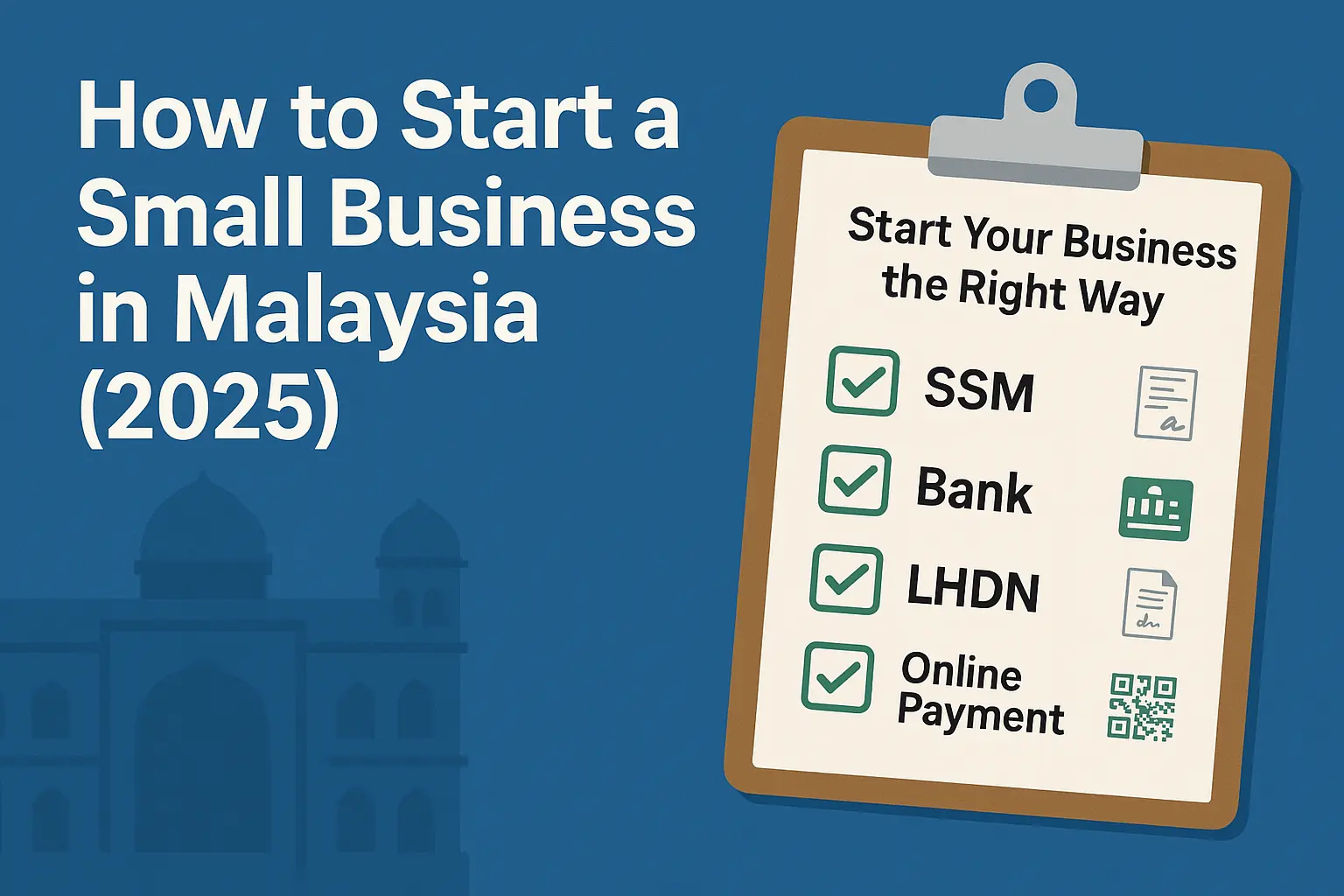If you’re thinking about starting a small business in Malaysia, you’re not alone. Every day, more Malaysians, from fresh grads to stay-at-home parents to laid-off execs are trying to figure out how to register their SSM, open a bank account, collect payments online, and most importantly, not get into trouble with LHDN.
But here’s the truth: most resources out there are either too technical, too outdated, or just too surface-level. This is not one of them.
This practical 2025 guide gives you the exact steps to get legit, from business registration to setting up your DuitNow QR, and even preparing for your first tax season. Whether you’re selling on Shopee, running a freelance service, or turning your baking side hustle into a brand, you’ll find everything you need here.
1. Choose the Right Business Structure (Don’t Skip This)
Before you collect a single sen, decide how you want to operate.
A. Enterprise (Sole Proprietorship / Partnership)
- Fastest and cheapest to set up
- RM30–RM60 registration cost
- You are personally liable for all business risks
- Best for: freelancers, part-time sellers, home bakers, ejen dropship
This is the structure 90% of Malaysians start with. But remember: if something goes wrong, you are legally responsible, not the business.
B. Sdn Bhd (Private Limited Company)
- Separate legal entity from you
- Limited liability protection (your personal assets are safer)
- Higher setup and compliance requirements
- Best for: scalable businesses, tech startups, high-risk or high-volume operations
Start with Enterprise if you're testing the waters. Go Sdn Bhd once you're hiring people, raising funds, or landing serious clients.
2. Register with SSM Properly (Don’t Just “Get It Over With”)
A surprising number of people still collect payments without an SSM, until their bank or LHDN calls. Don’t be that person.
Enterprise via EzBiz:
- Go to https://ezbiz.ssm.com.my
- Register an account
- Submit Form A with IC, selfie, and address proof
- Pay RM30 (if using personal name) or RM60 (if using a brand name)
- Get your Business Registration Certificate (Form D)
Sdn Bhd via MyCoID:
- Use https://www.ssm.com.my
- Reserve your company name
- Submit incorporation details through the Super Form
- Pay RM1,000 fee
- Appoint a company secretary within 30 days
- Get Section 15 Certificate of Incorporation
Tip: If you’re planning to open a bank account or apply for payment gateways, make sure your SSM details match your product/service niche.
3. Open a Business Bank Account (Separating Finances = Step One to Being Serious)
Banks like Maybank, CIMB, and Public Bank now strictly require:
- Your original SSM certificate (Form D or Section 15)
- Business Profile Printout
- NRIC / Passport of business owner or directors
- Board resolution & constitution (for Sdn Bhd)
- Minimum deposit (varies from RM500–RM1,000)
Pro tip: Don’t use your personal bank account for business. Not only does it look unprofessional, it also exposes you to tax headaches and rejection from grants or payment processors.
Bonus Tip: Most banks and agencies will ask for your official company chop.
If you don’t have one yet, you can create a digital version instantly for only RM3.99 at CopOnline.my.
4. Enable Online Payments (You’ll Need This Sooner Than You Think)
Even if you’re not building a website, your customers will ask: “Ada DuitNow tak? Boleh scan QR? Boleh pakai FPX?”
Here are your options:
- ToyyibPay: Easy approval, low fees, Islamic-compliant
- Billplz: Strong FPX support, great for invoicing
- Stripe Malaysia: Global, clean UI, ideal for digital products
- iPay88 / eGHL: Local, trusted by SMEs
Required documents:
- Valid SSM certificate
- Business bank account
- NRIC/passport
- Link to your product or service (social media, WhatsApp catalog, or simple site)
Some providers will even auto-generate your DuitNow QR for storefront or WhatsApp.
5. Register with LHDN Early (Not After You Get the Letter)
If you make income from business, you must register with LHDN.
Enterprise / Freelancers:
- Apply for a tax number
- File Form B (business income) annually by June 30
Partnerships:
- File Form P for the business
- Each partner submits Form B individually
Sdn Bhd:
- Register for corporate tax
- File Form C within 7 months of financial year end
Don’t wait until they send a letter. Register early and start clean. Plus, having clean tax records improves your chances for bank loans, grants, and even collaborations down the road.
6. Optional (But Smart): Tap Into Grants & Support
Once you’re registered and have a bank account, consider applying for support:
SME Corp: Microenterprise grants, coaching, funding access
MDEC: Digital grants, tech training, e-commerce onboarding
These aren’t handouts, you’re already paying tax. Might as well claim what’s meant to help your business grow.
Join thousands of Malaysians receiving expert advice on saving, investing, and financial planning every week.
7. Common Mistakes That Cost New Business Owners Time, Money & Peace
- Using your personal bank account for all sales
- Forgetting to renew SSM annually (Enterprise expires!)
- Assuming LHDN won’t find your Shopee or freelance gigs
- Keeping zero records (LHDN needs 7 years of receipts)
- Skipping SST registration when your revenue exceeds RM500,000
Avoid these, and you’re already ahead of most.
Want to Build Your Own Empire?
You might not be born into millions of ringgit, but you can still play the game smart. Start your journey here:
- 6 Passive Income Ideas That Still Work in Malaysia (Even During a Recession)
- How to Become Rich in Malaysia (2025): A Step-by-Step Guide
Your generational wealth starts now, or at least, your plan for it does.
Final Thoughts: The Legit Path Pays Off
Starting a business in Malaysia is one of the simplest in Southeast Asia, but the ease is also what causes people to cut corners.
If you’re serious about building income, freedom, and something you can scale:
- Register properly
- Open the right accounts
- Keep your records clean
- File your taxes on time
You’ll sleep better, look more professional, and unlock more opportunities, from grants to brand deals to clients who pay faster.
Want this in a one-page checklist?
Join 2,000+ others starting small businesses in Malaysia
Disclaimer: This article is for informational purposes only. For professional guidance, consult SSM, LHDN, or a licensed advisor.







3 thoughts on “How to Start a Small Business in Malaysia (2025 Guide)”